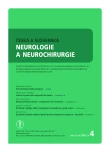Problems Involved in Indications for Operative Treatment in Intramedullary Lesions
Authors:
M. Smrčka 1; A. Šprláková 2; V. Smrčka 1; M. Keřkovský 2
Authors‘ workplace:
LF MU a FN Brno
Neurochirurgická klinika
1; LF MU a FN Brno
Radiologická klinika
2
Published in:
Cesk Slov Neurol N 2010; 73/106(4): 393-397
Category:
Review Article
Overview
The diagnostics of intramedullary lesions remain difficult even in these days of MRI. Verification of the aetiology of the pathological process is very important from a neurosurgical point of view, because it plays a substantial part in indications for operative treatment. It is vital that such indication be clearly established, since operations for intramedullary lesion involve a high risk of iatrogenic damage to the patient. In general, tumour and vascular malformations are considered sufficient reasons for operation. On the other hand, conservative treatment is usually preferred for non-tumorous expansions. Differential diagnosis with the aid of MRI is difficult, not only in terms of the type of the tumour but further in terms of distinguishing between tumorous and non-tumorous lesions (inflammation, ischemia, demyelinisation). Sometimes even the patient’s history and neurological examination cannot help. The authors of this article illustrate this difficult topic by means of several case reports. They recommend that, should some doubt exist about the aetiology of the process, operative treatment (including biopsy) always be delayed, and a follow-up MRI performed after some time. In the end, the natural course of the disease will usually indicate how best to proceed.
Key words:
intramedullary tumour – magnetic resonance imaging – surgery
Sources
1. McCormick PC, Stein BM. Spinal Cord Tumors in Adults. In: Youmans JR (ed). Neurological Surgery: A Comprehensive Reference Guide to the Diagnosis and Management of Neurosurgical Problems. New York: WB Saunders 1996.
2. White JB, Miller GM, Layton KF, Krauss WE. Nonenhancing tumors of the spinal cord. J Neurosurg Spine 2007; 7(4): 403–407.
3. Lee M, Epstein FJ, Rezai AR, Zagzag D. Nonneoplastic intramedullary spinal cord lesions mimicking tumors. Neurosurgery 1998; 43(4): 788–794.
4. Solmaz I, Onal MB, Civelek E, Sirin S, Kahraman S. Intramedullary lumbar lesion mimicking spinal cord tumor: a case of non-neoplastic intramedullary spinal cord lesion. Eur Spine J 2010; 19 (Suppl 2): S169–S173.
5. Na JH, Kim HS, Eoh W, Kim JH, Kim JS, Kim ES. Spinal cord hemangioblastoma: diagnosis and clinical outcome after surgical treatment. J Korean Neurosurg Soc 2007; 42(6): 436–440.
6. Seo HS, Kim JH, Lee DH, Lee YH, Suh SI, Kim SY et al. Nonenhancing intramedullary astrocytomas and other MR imaging features: a retrospective study and systematic review. AJNR Am J Neuroradiol 2010; 31(3): 498–503.
7. Bian LG, Bertalanffy H, Sun QF, Shen JK. Intramedullary cavernous malformations: clinical features and surgical technique via hemilaminectomy. Clin Neurol Neurosurg 2009; 111(6): 511–517.
8. Kim LJ, Spetzler RF. Classification and surgical management of spinal arteriovenous lesions: arteriovenous fistulae and arteriovenous malformations. Neurosurgery 2006; 59 (5 Suppl 3): S195–S201.
9. Rodriguez FJ, Crum BA, Krauss WE, Scheithauer BW, Giannini C. Venous congestive myelopathy: a mimic of neoplasia. Mod Pathol 2005; 18(5): 710–718.
10. Brinar M, Radoš M, Habek M, Poser CM. Enlargement of the spinal cord: inflammation or neoplasm? Clin Neurol Neurosurg 2006; 108(3): 284–289.
11. Varron L, Broussolle C, Candessanche JP, Marignier R, Rousset H, Ninet J et al. Spinal cord sarcoidosis: report of seven cases. Eur J Neurol 2009; 16(3): 289–296.
12. Cohen-Gadol AA, Zikel OM, Miller GM, Aksamit AJ, Scheithauer BW, Krauss WE. Spinal cord biopsy: a review of 38 cases. Neurosurgery 2003; 52(4): 806–815.
Labels
Paediatric neurology Neurosurgery NeurologyArticle was published in
Czech and Slovak Neurology and Neurosurgery

2010 Issue 4
Most read in this issue
- Dynamic Magnetic Resonance Imaging of a Lumbar Spine – a Case Report
- Pharmacological Approaches to the Treatment of Epilepsy
- Treatment of Juxtafacet Cyst of the Lumbar Spine by Dynamic Interspinous Stabilization – a Case Report
- Functional Significance of a Temporal Lobe
